Robert Freeman shines when it comes to the family dynamics of The Boondocks. This pivotal character binds the family, playing the antagonist to his grandsons’ exploits.
Yet, amid these conflicts, Grandad’s dedication and love for his family remain apparent. His stern discipline, often cloaked in ‘tough love,’ affirms his unwavering support for his family.
He becomes the bedrock, infusing stability, care, and humor into the family, a testament to the diverse nature of familial ties.
Who Is Robert Freeman?
He’s a soft-hearted disciplinarian who often wrestles between maintaining order and indulging his whimsical desires. Although he is a man of the older generation, Grandad is no stranger to the changing world around him, often engaging in it with a unique blend of skepticism and curiosity.
This duality paints a compelling picture of a man grappling with raising his two grandsons in a rapidly changing society.
Nickname
- Granddad (by his grandsons)
- Mr. Bitches (himself)
- Pops (by Thugnificent)
Watch The Episode “Robert Freeman and Segregation”
Grandad’s Humor and Wisdom
Robert Freeman masterfully embodies the role of the comical, sometimes naive, grandfather we all know and love. His hilarious one-liners and outlandish antics provide comic relief, yet they carry a depth often overlooked.
Underneath the humor is a wealth of wisdom honed through his experiences and struggles.
In every laugh-inducing moment, a hint of profound insight, a nugget of knowledge, offered without pretension. This blend of humor and wisdom defines Grandad, showing us that laughter can be an effective conduit for life’s most valuable lessons.
A Symbol of Adaptation
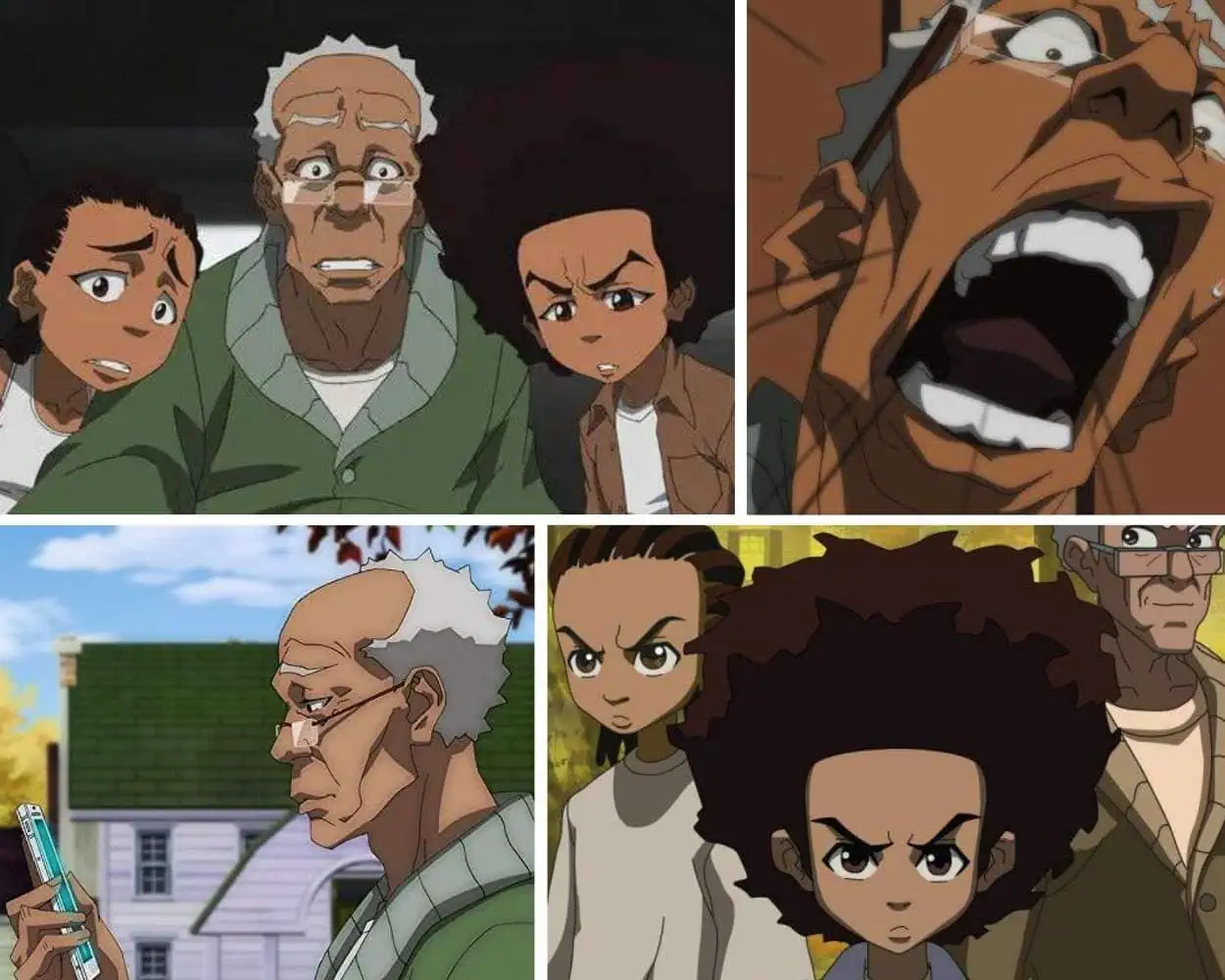
Robert Freeman consistently evolves as a character, challenging older generations’ stagnant, inflexible perceptions. He’s a master adaptor, navigating through an environment that’s both foreign and hostile.
Grandad’s ability to embrace change, whether adopting new technologies or adjusting to modern societal norms, is impressive.
His resilience speaks volumes about his commitment to growth, marking him as a symbol of adaptation, fluidity, and transformation in the face of progress.
His Personality
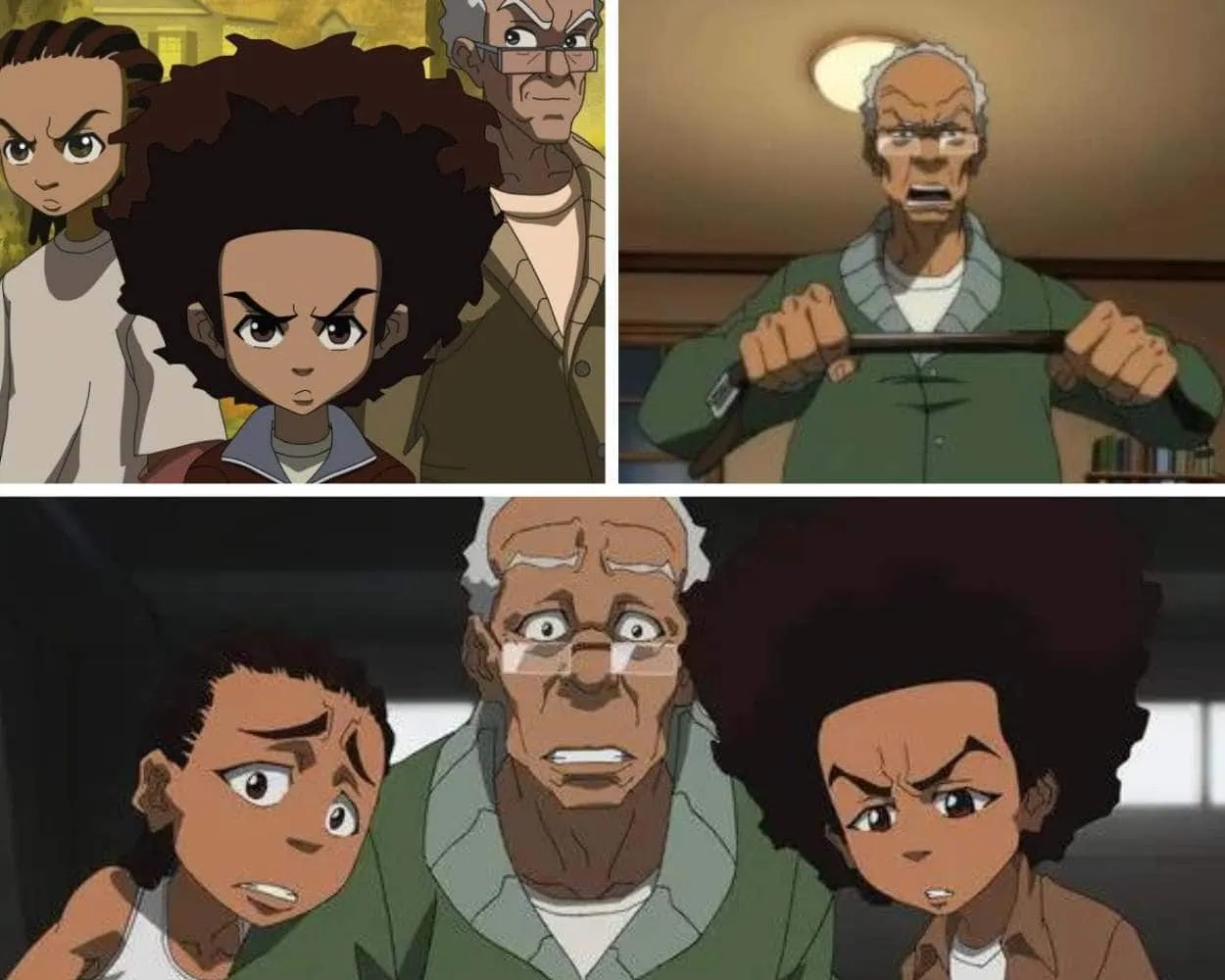
Robert, although old, lacks wisdom and consistently evades taking responsibility for his actions, failing to learn any lessons from them.
Displaying overt pride, impatience, and intolerance, he endorses strict discipline, resorting to his belt swiftly whenever the boys defy his orders.
“I hate to see a child go unbeaten,” he professes, undermining his credibility as a positive parental figure or influence. Undeterred by any sense of morality, he nonchalantly sneaks into movies without paying. A dream sequence exposes his cowardly nature, revealing how quickly he deserts friends and family to ensure his safety.
Self-proclaimed as a “Civil Rights Legend,” Robert often faces scrutiny from others in the series. He confidently recounts his experiences during those times, audaciously placing himself alongside other significant figures of the period.
However, he seems to have accrued more animosity from Black people than Whites. He also asserts a relation to Jackie Robinson, insisting that the Freeman in his name remains silent.
Robert Freeman & Huey Freeman
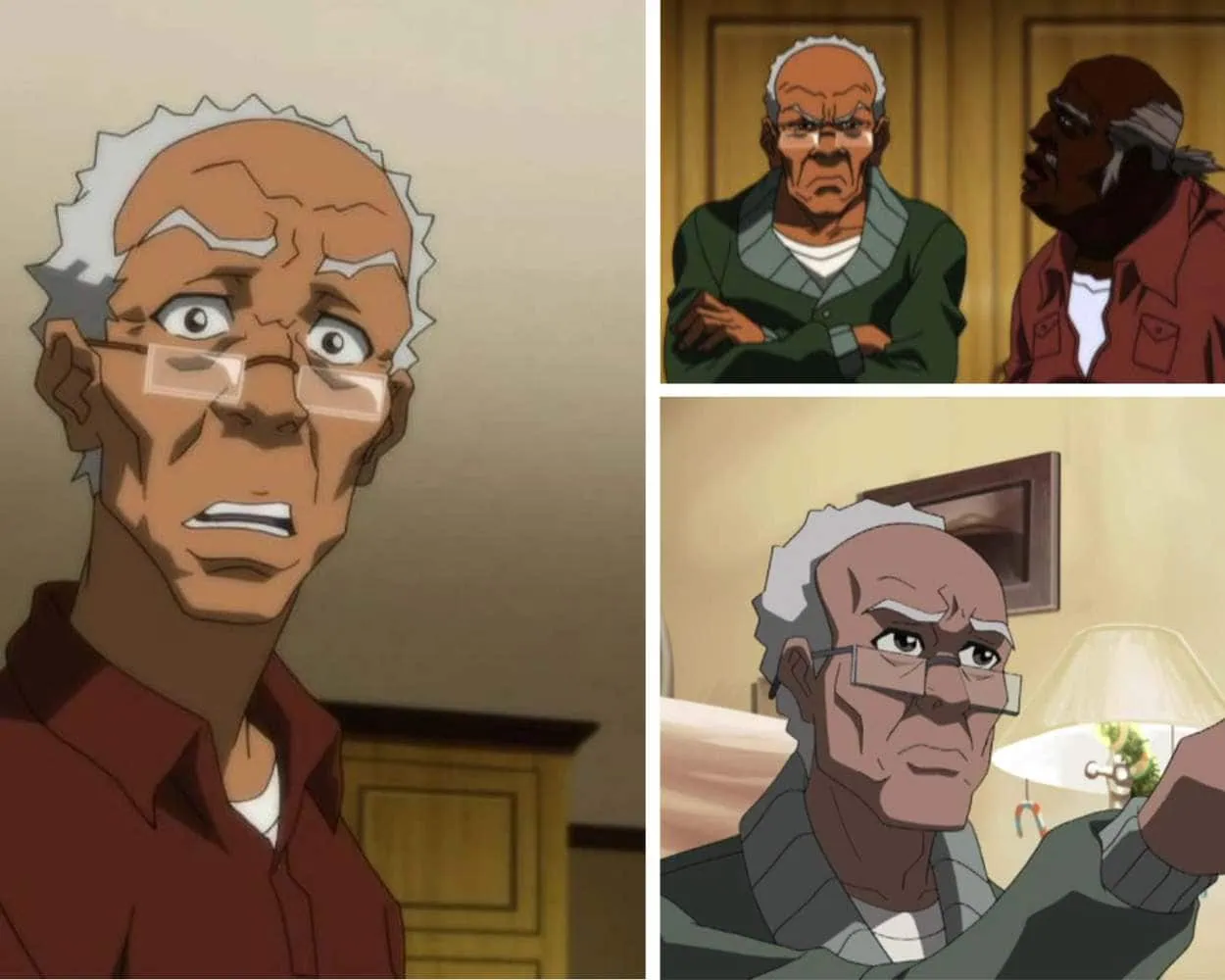
Huey often harbors deep affection for his Granddad, but Robert’s troublesome behavior—selfishness, pride, and arrogance—makes respecting him a struggle.
Huey tirelessly advises and warns his grandfather against risky ventures, encompassing scams and relationships, yet Robert routinely ignores his advice. As a result, he suffers the consequences, leaving young Huey to clean up his messes.
Huey skillfully dodges Robert’s disciplinary belt, a fate others have not been so lucky to avoid. This is not only due to his agility but also because he typically behaves better than his brother, Riley.
Riley & Robert
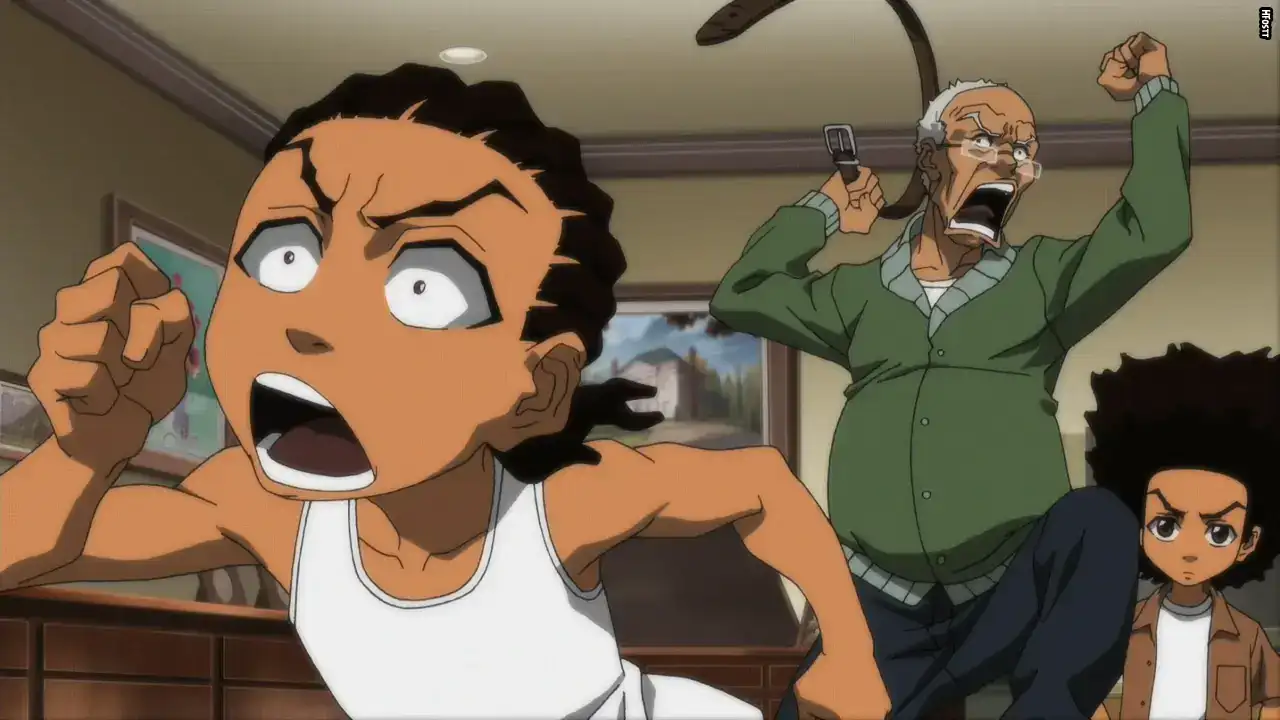
Robert harshly disciplines Riley; his disobedience, disrespect for Robert’s authority, and participation in neighborhood mischief fuel his strict treatment.
Riley’s blatant disregard for Robert’s rules and authority poses a difficult adjustment, leading to regular damage to their house. This destruction typically unfolds when Riley picks fights with Huey, compelling Robert to control him with force.
Robert tries to keep Riley in line using physical discipline, but this approach is futile as Riley is already acclimated to such harsh treatment. The varying treatment between Huey and Riley is noticeable.
Robert punishes Riley physically and finds manipulating him less challenging due to their shared materialistic desires and monetary interests. This insinuates that Robert may have resembled a troublemaker like Riley in his youth, while his sister Cookie might have acted as the responsible sibling akin to Huey.
Jazmine Dubois and Robert
Robert harbors a deep affection for Jazmine, frequently addressing her as “Little Baby” and showering her affectionately. Jazmine’s innocent, childlike demeanor likely triggers this fondness, setting her apart from Huey and Riley. In return, Jazmine doesn’t hesitate to reciprocate his feelings, seeing Robert as part of her family.
There are, however, moments when Jazmine becomes justifiably angry with Robert. When he lands her in trouble or nudges her to break the rules, it incites conflicts between them.
But she usually forgives him in no time. Intriguingly, Robert’s exchanges with Jazmine often mirror those of a doting grandparent rather than interactions with his grandsons.
But one must point out some discrepancies. In Robert’s dream involving Stinkmeaner, he ruthlessly threw Jazmine down the stairs without worrying about her safety. Likewise, in the episode about the fried chicken flu, he hesitated to let Jazmine into the house.
Robert & Ebony Brown
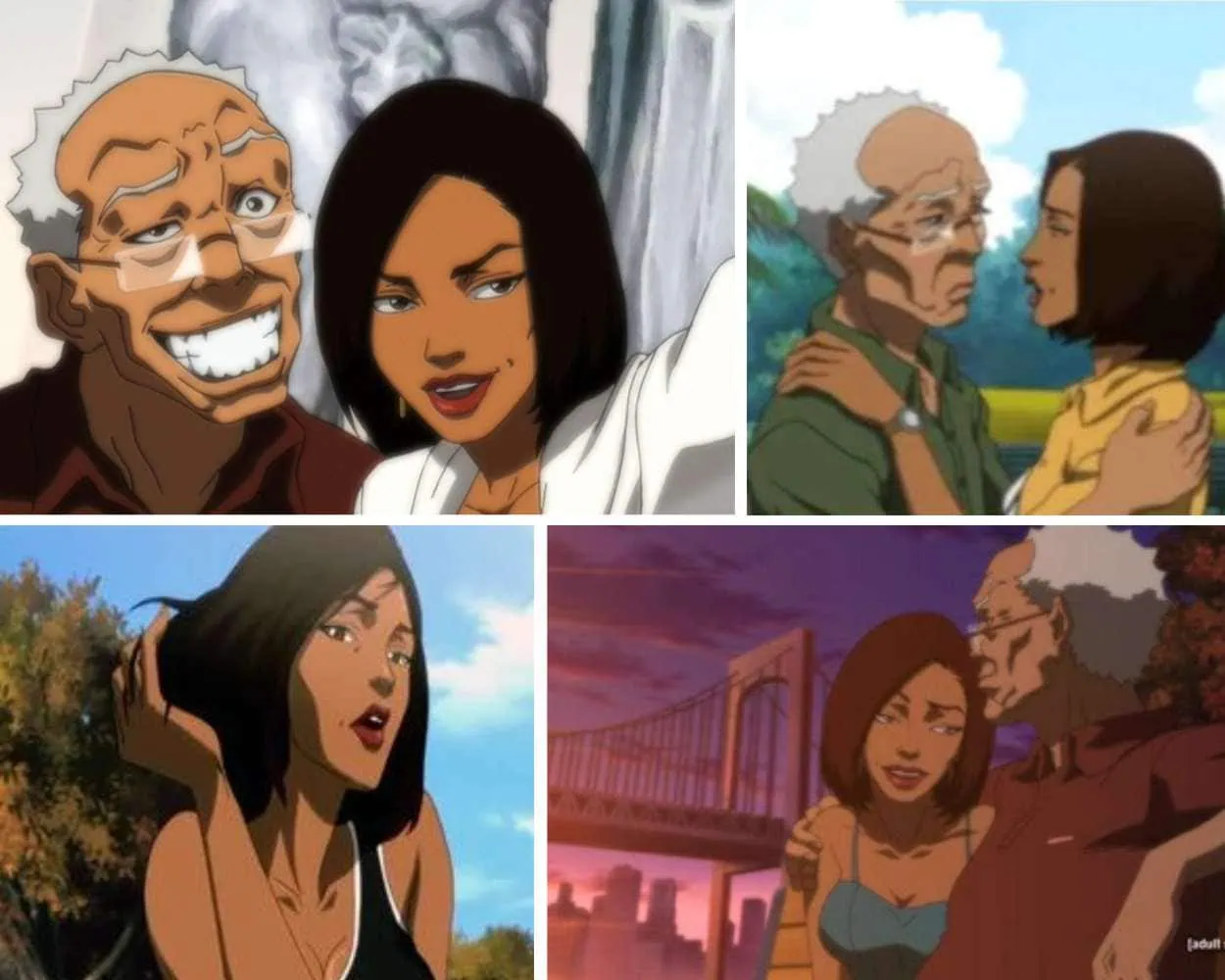
Robert found his most profound experience of mutual romance with Ebony Brown.
In their time as a couple, love blossomed deeply between Robert and Ebony. However, as their love story unfolded, doubts about Ebony’s fidelity consumed Robert. He convinced himself that he wasn’t worthy of her love.
When Ebony went silent for 16 hours, his fears spiraled out of control, pushing him into a state of depressive fear that she had left him forever.
Recognizing Robert’s plight, his friends Riley and Huey, leveraging insights from Ebony’s Twitter activity, embarked on a mission to find her.
Their quest led them to Malaysia, where Robert and Ebony were finally reunited. Ebony revealed a 12-hour flight delay and a malfunctioning phone were behind her abrupt silence.
The Family from Chicago’s South Side
The animated series “The Boondocks,” which features a colorful array of cartoon characters, premiered on November 6, 2005, and concluded on June 23, 2014. Over its four-season run, the show released a total of 55 episodes.
Notably, the fourth and final season was produced with lesser involvement from creator Aaron McGruder.
Beyond the United States, the series has also found viewership in syndication and has been made available through various home media platforms, including DVD sets and on-demand streaming services like Netflix.
Even after its conclusion, the show’s reruns were aired on Adult Swim until June 8, 2017, when it was moved to HBO Max.
Grandad From “The Boondocks” Was A Total Savage
What are some memorable moments of Robert Freeman in the series?
Robert Freeman has many memorable moments throughout The Boondocks. Some notable instances include his various attempts at finding love, unsuccessful stints in the restaurant business, encounters with a rogue pimp, and frequent disciplinary attempts involving his grandsons, which often result in comedic outcomes.
How does Robert Freeman’s character contribute to the themes in The Boondocks?
Robert Freeman serves as a bridge between the past and the present. His experiences offer commentary on issues such as race, culture, and societal change.
His character also provides comic relief while highlighting the generational gap and cultural shifts. His resilience in the face of adversity resonates with audiences and often drives the show’s persistence, resistance, and adaptability themes.